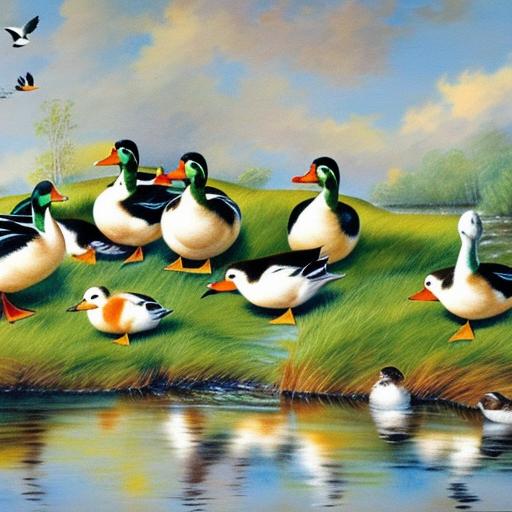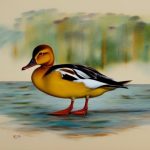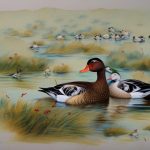Ducks are fascinating creatures with unique behaviors that make them a popular choice for backyard farming. Understanding duck behavior is essential for anyone considering raising ducks, as it can help ensure the well-being and productivity of the birds. Ducks are social animals that thrive in the company of others, and they often form strong bonds with their flock mates. They are also highly adaptable and can thrive in a variety of environments, from ponds and lakes to backyard gardens. Ducks are known for their curious and inquisitive nature, and they are often seen exploring their surroundings and foraging for food. Additionally, ducks are highly vocal animals and use a wide range of vocalizations to communicate with each other. By understanding these behaviors, duck owners can create a suitable environment for their birds and provide them with the care and attention they need to thrive.
Ducks are also known for their strong maternal instincts, making them excellent brooders and mothers. They are attentive and protective parents, and they will go to great lengths to care for their young. This behavior makes ducks an ideal choice for those looking to raise their own ducklings, as the mother duck will take on the responsibility of raising and caring for her offspring. Additionally, ducks are known for their playful and entertaining behavior, often engaging in activities such as splashing in water, chasing insects, and even playing with toys. Understanding these behaviors can help duck owners provide their birds with enrichment and stimulation, ensuring they lead happy and healthy lives. Overall, understanding duck behavior is crucial for anyone considering raising ducks, as it can help create a suitable environment for these unique and fascinating birds.
Key Takeaways
- Ducks are social animals and exhibit a range of behaviors including foraging, preening, and swimming.
- Docile duck breeds are known for their calm and friendly nature, making them ideal for beginners and families.
- Raising docile duck breeds can provide a sustainable source of eggs, meat, and pest control for your property.
- Popular docile duck breeds include the Pekin, Swedish, and Cayuga, known for their gentle temperament and high egg production.
- To successfully raise docile duck breeds, provide them with a secure and spacious living environment, access to water, and a balanced diet.
Characteristics of Docile Duck Breeds
Docile duck breeds are known for their calm and friendly nature, making them an ideal choice for those new to duck keeping or looking for a family-friendly pet. These breeds are typically easy to handle and are less likely to exhibit aggressive behavior towards humans or other animals. Docile duck breeds are also known for their gentle disposition, making them well-suited for interaction with children and other pets. Additionally, these breeds are often more adaptable to confinement, making them a good choice for those with limited space or looking to keep ducks in a backyard setting. Docile duck breeds also tend to be good layers, producing a consistent supply of eggs throughout the year. This makes them a popular choice for those looking to raise ducks for both meat and egg production. Overall, the characteristics of docile duck breeds make them an excellent choice for those looking for a low-maintenance and friendly addition to their backyard farm.
In addition to their calm and friendly nature, docile duck breeds often have attractive physical characteristics that make them a popular choice among duck enthusiasts. Many docile duck breeds have striking plumage in a variety of colors and patterns, making them a visually appealing addition to any farm or backyard setting. These breeds also come in a range of sizes, from small bantam breeds to larger, more robust varieties. This diversity allows duck owners to choose a breed that best suits their individual needs and preferences. Docile duck breeds also tend to have strong immune systems and are less prone to health issues, making them a low-maintenance option for those new to duck keeping. Additionally, these breeds are often good foragers, making them well-suited for free-range or pasture-based farming systems. Overall, the characteristics of docile duck breeds make them an attractive option for those looking to raise ducks for both companionship and productivity.
Benefits of Raising Docile Duck Breeds
Raising docile duck breeds offers a wide range of benefits for both experienced farmers and those new to duck keeping. One of the primary benefits of raising docile duck breeds is their calm and friendly nature, which makes them easy to handle and interact with. This makes them an ideal choice for those looking to involve children in the care of the birds or for those seeking a low-maintenance addition to their farm or backyard. Additionally, docile duck breeds are often good layers, producing a consistent supply of eggs throughout the year. This makes them a valuable addition to any farm or homestead, providing a source of fresh eggs for consumption or sale. Docile duck breeds are also known for their adaptability to a variety of environments, making them well-suited for both free-range and confined farming systems. This versatility allows duck owners to raise these birds in a way that best suits their individual needs and preferences.
Another benefit of raising docile duck breeds is their strong maternal instincts, making them excellent brooders and mothers. This makes them an ideal choice for those looking to raise their own ducklings, as the mother duck will take on the responsibility of caring for her offspring. Additionally, docile duck breeds are often good foragers, making them well-suited for pasture-based farming systems. This allows duck owners to provide their birds with a natural diet while also reducing feed costs. Furthermore, raising docile duck breeds can provide a source of entertainment and companionship, as these birds are known for their playful and entertaining behavior. Overall, the benefits of raising docile duck breeds make them an attractive option for those looking to add ducks to their farm or backyard.
Popular Docile Duck Breeds
There are several popular docile duck breeds that are well-suited for both experienced farmers and those new to duck keeping. One popular docile duck breed is the Pekin duck, known for its calm and friendly nature, making it an ideal choice for those looking for a low-maintenance addition to their farm or backyard. Pekin ducks are also good layers, producing a consistent supply of large white eggs throughout the year. Another popular docile duck breed is the Khaki Campbell, known for its excellent egg-laying abilities and calm temperament. Khaki Campbell ducks are also good foragers, making them well-suited for free-range or pasture-based farming systems.
The Indian Runner is another popular docile duck breed known for its upright stance and excellent egg-laying abilities. Indian Runner ducks come in a variety of colors and patterns, making them an attractive addition to any farm or backyard setting. The Welsh Harlequin is another popular docile duck breed known for its calm and friendly nature, making it an ideal choice for those new to duck keeping or looking for a family-friendly pet. Welsh Harlequin ducks are also good layers, producing a consistent supply of eggs throughout the year. Overall, these popular docile duck breeds offer a wide range of benefits for those looking to add ducks to their farm or backyard.
Tips for Raising Docile Duck Breeds
Raising docile duck breeds requires careful consideration and attention to ensure the well-being and productivity of the birds. One important tip for raising docile duck breeds is to provide them with a suitable living environment that meets their specific needs. This includes access to clean water for swimming and drinking, as well as shelter from predators and inclement weather. Additionally, providing ample space for the ducks to roam and forage is essential for their physical and mental well-being. Another important tip is to provide a balanced diet that meets the nutritional needs of the ducks. This includes a combination of commercial feed, fresh greens, and access to insects and other natural foods.
Another tip for raising docile duck breeds is to handle them regularly from a young age to ensure they become accustomed to human interaction. This can help reduce stress and aggression in the birds, making them easier to handle as they mature. Additionally, providing enrichment such as toys, puzzles, and access to natural water sources can help keep the ducks entertained and stimulated. It is also important to monitor the health of the ducks regularly and seek veterinary care if any issues arise. Overall, following these tips can help ensure the successful raising of docile duck breeds.
Potential Challenges of Raising Docile Duck Breeds

While raising docile duck breeds offers many benefits, there are also potential challenges that should be considered before bringing these birds onto the farm or homestead. One potential challenge is the need for adequate space and access to water. Ducks require ample space to roam and forage, as well as access to clean water for swimming and drinking. Providing this space can be challenging for those with limited land or resources. Additionally, maintaining clean water sources can be time-consuming and costly, requiring regular cleaning and maintenance.
Another potential challenge of raising docile duck breeds is their susceptibility to predators. Ducks are vulnerable to a wide range of predators, including foxes, raccoons, birds of prey, and even domestic pets. Protecting ducks from predators requires secure fencing, predator-proof housing, and regular monitoring of the birds’ surroundings. Additionally, ducks can be messy animals, especially when it comes to water play. Managing mud and water runoff can be challenging, particularly in confined spaces or urban environments.
Furthermore, ducks can be noisy animals, particularly during mating season or when they feel threatened. This can be disruptive in urban or suburban settings where noise ordinances may apply. Finally, while docile duck breeds are generally easy to handle, they still require regular care and attention to ensure their well-being. This includes providing proper nutrition, monitoring health, and addressing any behavioral issues that may arise.
Choosing the Right Duck Breed for You
In conclusion, understanding duck behavior is essential for anyone considering raising ducks, as it can help ensure the well-being and productivity of the birds. Docile duck breeds offer many benefits, including their calm and friendly nature, excellent egg-laying abilities, adaptability to various environments, strong maternal instincts, and entertaining behavior. Popular docile duck breeds such as Pekin ducks, Khaki Campbells, Indian Runners, and Welsh Harlequins are well-suited for both experienced farmers and those new to duck keeping.
When raising docile duck breeds, it is important to provide them with a suitable living environment that meets their specific needs, including access to clean water, shelter from predators and inclement weather, ample space for roaming and foraging, a balanced diet that meets their nutritional needs, regular handling from a young age to ensure they become accustomed to human interaction, enrichment such as toys and access to natural water sources, and regular monitoring of their health.
While there are potential challenges associated with raising docile duck breeds such as the need for adequate space and access to water, susceptibility to predators, messiness, noise levels, and regular care requirements; these challenges can be managed with proper planning and attention.
Ultimately, choosing the right duck breed depends on individual needs and preferences; however, docile duck breeds offer many benefits that make them an attractive option for those looking to add ducks to their farm or backyard.
Docile duck breeds are known for their calm and friendly nature, making them easier to handle and interact with. This can be especially beneficial for families with children or those who want to have a more hands-on experience with their ducks. Additionally, docile duck breeds are often good egg layers, providing a steady supply of eggs for those interested in raising ducks for their eggs. Their peaceful demeanor also makes them less likely to cause trouble or disrupt the peace in a backyard or farm setting. Overall, choosing a docile duck breed can lead to a more enjoyable and manageable experience for duck owners.
If you’re interested in learning more about the most docile duck breeds, you might also want to check out this article on creating a comfortable and safe chicken coop environment at Poultry Wizard. Providing a secure and cozy space for your ducks is essential for their well-being, and this article offers valuable insights into creating an ideal living space for your feathered friends.
FAQs
What are the most docile duck breeds?
Some of the most docile duck breeds include the Pekin, Swedish, Cayuga, and Indian Runner ducks.
What characteristics make a duck breed docile?
Docile duck breeds are typically calm, friendly, and easy to handle. They are less likely to exhibit aggressive behavior and are often good with children and other animals.
Are docile duck breeds good for beginners?
Yes, docile duck breeds are often recommended for beginners due to their calm and friendly nature, making them easier to handle and care for.
Do docile duck breeds require special care or attention?
While docile duck breeds may be easier to handle, they still require proper care and attention, including access to clean water, a balanced diet, and appropriate shelter.
Can docile duck breeds be kept as pets?
Yes, many people keep docile duck breeds as pets due to their friendly nature and ease of handling. They can also provide pest control in gardens and are enjoyable to watch.
Meet Walter, the feathered-friend fanatic of Florida! Nestled in the sunshine state, Walter struts through life with his feathered companions, clucking his way to happiness. With a coop that’s fancier than a five-star hotel, he’s the Don Juan of the chicken world. When he’s not teaching his hens to do the cha-cha, you’ll find him in a heated debate with his prized rooster, Sir Clucks-a-Lot. Walter’s poultry passion is no yolk; he’s the sunny-side-up guy you never knew you needed in your flock of friends!







